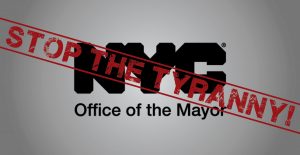 On June 23, 2020, the American Freedom Law Center filed a motion for preliminary injunction on behalf of political activist Pamela Geller asking a federal court in Manhattan to issue a preliminary injunction forbidding Governor Cuomo and Mayor de Blasio from enforcing their executive orders forbidding all protests of more than 10 people in New York City.
On June 23, 2020, the American Freedom Law Center filed a motion for preliminary injunction on behalf of political activist Pamela Geller asking a federal court in Manhattan to issue a preliminary injunction forbidding Governor Cuomo and Mayor de Blasio from enforcing their executive orders forbidding all protests of more than 10 people in New York City.
The motion for preliminary injunction follows the filing of Geller’s federal civil rights lawsuit last week in the U.S. District Court for the Southern District of New York. The lawsuit challenges the executive orders of New York Governor Andrew Cuomo and New York City Mayor Bill de Blasio—orders which prohibit protests in the City except the government-approved protests of Black Lives Matter (BLM).
Here is an excerpt from the brief filed in support of the motion:
“Liberty once lost is lost forever.” – John Adams
This case seeks to protect and vindicate fundamental liberties that citizens of the United States enjoy free from government interference. These liberties are not conferred or granted by government to then be rescinded at the will and whim of government officials. These liberties, endowed by our Creator, are possessed by the people, and they are guaranteed against government interference by the United States Constitution, which is the supreme law of the land. First among these liberties is the right to peacefully protest government officials through the freedom of speech and the right to peaceably assemble with others of like mind, both of which are guaranteed by the First Amendment.
The right to freedom of speech is not a right to catharsis. It is a right to meaningfully protest and assemble in public in order to change public policy. The most effective way to exercise this right is to organize and participate in a public protest as a group—there is no adequate alternative to this method of expressing opposition to the government, its officials, and their policies. Our nation’s history and experience with the civil rights movement bear this out, as do the recent protests surrounding the death of George Floyd—protests that are embraced, supported, and encouraged by Defendants.
Defendants, through the adoption and enforcement of executive edicts, have suspended the fundamental right to freedom of speech and to peaceably assemble in the City of New York for some protestors, including Plaintiff Geller, but not others in direct violation of the First and Fourteenth Amendments.
Through this lawsuit, Plaintiff Geller challenges Defendants’ selective suspension of the First Amendment. There is no justification—neither the fear of a pandemic nor public outcry over police brutality—for a government official to revoke this fundamental right for some of the people, but not for others. Indeed, there is neither a pandemic nor “primal therapy” [fn. a form of psychotherapy that suggests a need to find the source of early repressed trauma and, once discovered, to give it voice, oftentimes through screaming] exception to the fundamental liberties guaranteed by the Constitution. And Jacobson v. Commonwealth of Massachusetts, 197 U.S. 11 (1905), does not provide one. The Sixth Circuit recently affirmed this point. See Roberts v. Neace, 958 F.3d 409 (6th Cir. 2020) (granting injunction to enjoin the Kentucky governor’s restriction on the free exercise of religion during the current pandemic).
Indeed, Jacobson affirms the crucially important role of the judiciary (this Court) to ensure that such an exception never exits. Per the Supreme Court: “[I]f a statute purporting to have been enacted to protect the public health, the public morals, or the public safety, has no real or substantial relation to those objects, or is, beyond all question, a plain, palpable invasion of rights secured by the fundamental law, it is the duty of the courts to so adjudge, and thereby give effect to the Constitution.” Jacobson, 197 U.S. at 31 (emphasis added).
If this Court were to accept Defendants’ position, then it is the fiat of the Governor and Mayor, and not the Constitution, that is the supreme law of the land. Cf. Sterling v. Constantin, 287 U.S. 378, 397–98 (1932) (“If this extreme position could be deemed to be well taken, it is manifest that the fiat of a state Governor, and not the Constitution of the United States, would be the supreme law of the land; that the restrictions of the Federal Constitution upon the exercise of state power would be but impotent phrases[.]”); see also Planned Parenthood v. Casey, 505 U.S. 833, 857 (1992) (citing Jacobson for the proposition that “a State’s interest in the protection of life falls short of justifying any plenary override of individual liberty claims”); see generally United States v. Nat’l Treasury Emples. Union, 513 U.S. 454, 475 (1995) (“Fear of serious injury cannot alone justify suppression of free speech and assembly. Men feared witches and burnt women.”) (internal quotations and citation omitted); Ex parte Milligan, 71 U.S. (4 Wall.) 2, 121 (1866) (“No doctrine, involving more pernicious consequences, was ever invented by the wit of man than that any of its provisions can be suspended during any of the great exigencies of government. Such a doctrine leads directly to anarchy or despotism. . . .”).
Here, Defendants seek a “plenary override of individual liberty claims” through the enforcement of executive orders. What raises the alarm of governmental overreach to the level of an immediate constitutional crisis is the application of this executive override in favor of one particular message demanded by one group, large though it may be, but not for others whose messages per the Governor and Mayor are less pressing. The Court should forbid this patently biased attempt to refashion the First Amendment and grant Plaintiff’s motion.
